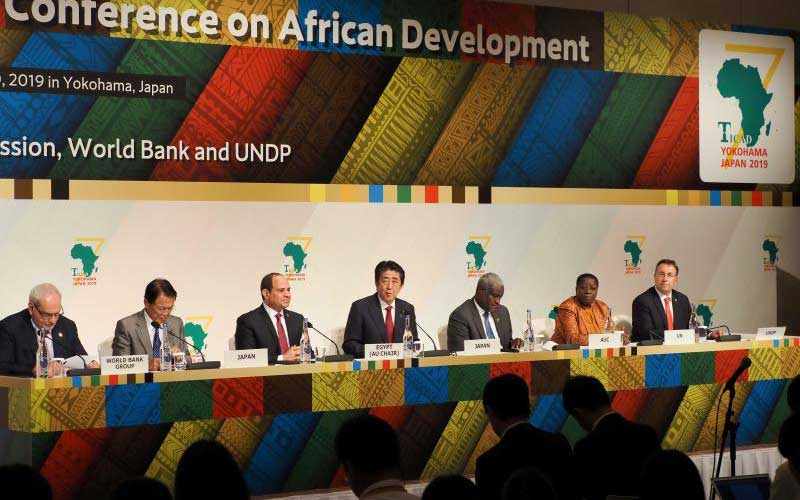African Heads of State, the government of Japan and representatives of international organisations who participated in the seventh Tokyo International Conference on African Development (TICAD 7) conference last week in Yokohama, Japan, through the adoption of the Yokohama Declaration of 2019, have committed to push for the inclusion of at least two African countries as permanent members of the United Nations Security Council.
In this endeavor, African countries, including Kenya, are banking heavily on the support of the Japanese government and influence of regional and international institutions such as the African Union.
Since the launch of the UN Security Council in 1945, the list of the council’s permanent members has only comprised five countries, including the United States, United Kingdom, China, Russia and France.
During discussions held at the TICAD summit, the participating countries and organisations unanimously agreed that the exclusion of African members from the list of permanent members of the UN Security Council equaled historical injustice against the continent.
“We acknowledge the historical injustice against Africa with regard to its representation in the security council and express support for full African representation in the Security Council, through not less than two permanent seats with all the prerogatives of permanent membership including the right of veto, and five non-permanent seats, in line with the African Commission Position as enshrined in Ezulwini Consensus and Sirte Declaration,” reads one of the resolutions in the Yokohama Declaration.
Since 1946, over 25 African countries, including Kenya, have served as non-permanent members of the UN Security Council, some having served more than one term on the council, with each term lasting two years.
The participants of the TICAD 7 conference additionally resolved to push for reforms of the UN Security Council, explaining that Africa can only win permanent membership in the UN Security Council if United Nations bodies undergo reforms.
In line with this belief, the summit participants also resolved to pursue changes at UN bodies, explaining in the Yokohama Declaration, “In keeping with previous declarations, we reaffirm our determination to urgently reform UN bodies, including the Security Council, and will maintain a political momentum through enhanced dialogue to find the best approach”.
Some of the previous declarations that have sought to have permanent African representation at the UN Security Council are AU’s Common African Position on Security Council Reform and the Ezulwini Consensus, which sought UN reforms and increased representation of African countries at key UN organizations, especially the Security Council.
These declarations argue that majority of Africa was not represented during UN’s establishment in 1945 and that Africa is now in a strong position of influence, therefore, needs better representation at UN bodies.
However, the more than 50 participating countries and organisations of TICAD 7 also noted that the reforms of UN bodies need to be thorough if they are to effectively help African get permanent representation at the Security Council.
“We reiterate that the reform of the Security Council should be addressed in a comprehensive, transparent and balanced manner, addressing all the five key issues including the question of the veto, and should garner the widest possible political acceptance by member states through the intergovernmental negotiations that re fully owned and handled by member states, as stipulated in the UN General Assembly Decision 62/557,” the participants jointly stated in the Yokohama Declaration.
The issue of UN reforms featured heavily in the talks between President Uhuru Kenyatta and Japan’s Prime Minister Shinzo Abe, which were held on the sidelines of the opening of the TICAD conference on August 28.
During the talks, President Uhuru also asked PM Abe to support Kenya’s efforts to win a non-permanent seat on the Security Council.
In August, Kenya won over Djibouti in the contest to represent Africa in the UN Security Council for the period of 2020-2021.
However, Kenya will need the vote of other UN members in June 2020, in order to win another term as a non-permanent member of the UN Security Council.
The Yokohama Declaration also acknowledged and congratulated Africa for its efforts in achieving and maintaining peace across the continent, stating, “We acknowledge the deepening of democratic practice and commend African-led efforts to address African challenges on peace and security, such as the recent progress observed in the Horn of Africa”.
Japan further commended Africa for its efforts in strengthening human rights, while expressing support for regional efforts geared towards peace.
With the Yokohama Declaration, the government of Japan additionally pledged to help African countries with other security challenges they face, both individually and collectively, noting, “Enhancing governance, combatting transnational organized crime, illicit financial flows and corruption, promoting peace-building, and countering illegal wildlife trade, terrorism and violent extremism are also issues of global priority. We commit to working individually and collectively to addressing these issues as urgent challenges”.



